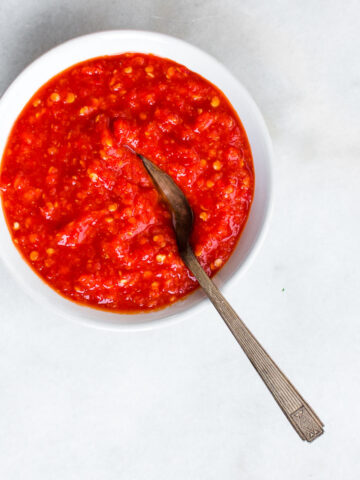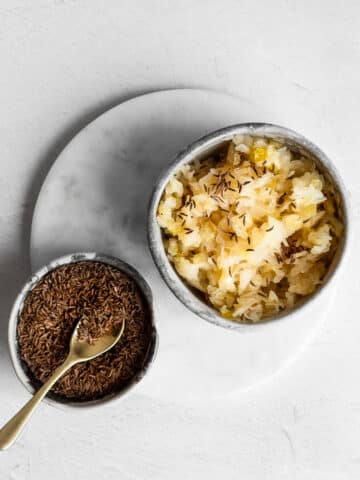When late summer hits, and your farmers market is brimming with okra, there's one surefire thing you can do with all the abundance: pickle them! BUT, if you want an even easier option, skip the vinegar, and make fermented okra instead.

Just like pickled okra made with vinegar and spices, fermented okra also offers that intense pop of sour flavor, but it's easier to make and it's also rich in probiotics.
Benefits of Fermented Okra
Like other fermented vegetables, fermented okra is a rich source of probiotics, vitamins, and food enzymes. Accordingly, it tends to support gut health and immune system function.
Okra is also extraordinarily rich in long-chain carbohydrates which act as a prebiotic, making it a fairly ideal candidate for fermentation. Even more, these long-chain carbohydrates also help support blood sugar balance, too. While these complex carbohydrates can give okra a slimy texture when cooked, okra remains crisp when fermented.
- Okra is rich in vitamin K, which helps your blood clot and supports skeletal health (1).
- Okra is high in antioxidants and phytonutrients that fight fatigue (2).
- Okra supports blood sugar balance and metabolic health (3).
Tips for Fermenting Okra
While it can feel complicated, fermenting vegetables is a fairly straightforward and simple process. All you need to do is place the okra and other ingredients into a jar, cover it with brine, seal the jar and wait. It really is that simple.
But, there are a few tips to help make sure your fermented okra comes out right every time. Paying attention to the quality of ingredients, minimizing exposure to air (and, thus, mold) with weights and proper seals can help your pickled okra come out right every time. Moreover, they're pretty standard tips for other fermented vegetables, like sour pickles and sauerkraut, too.
Pay attention to your ingredients.
Using good quality, unblemished ingredients that are fresh will improve the quality of your pickles.
- Use fresh, unblemished okra. Okra that is moldy, soft or damaged may spoil rather than ferment, ruining your pickles. Fresh, crisp, unblemished okra makes better pickles.
- Add a horseradish leaf. Horseradish leaf is rich in tannins which helps keep okra pickles crisp as they ferment. You can also use oak or grape leaf, or leave it out.
Keep the oxygen out.
Successful fermentation means that you want beneficial bacteria to grow while preventing the growth of pathogens and mold in your okra. So, use equipment that keeps okra submerged while it ferments, and seals that allow carbon dioxide to escape while preventing oxygen from coming in.
- Use fermentation weights. Okra will float in the brine, so you need to weigh the okra down to submerge it. Keeping it submerged prevents mold growth.
- Fill your jar to within 1-inch of the lip. Overfilling your jar will cause the brine to seep out, while underfilling it exposes your fermented okra to mold.
- Use a fermentation seal. Fermentation seals prevent oxygen from spoiling your pickles while allowing the carbon dioxide that builds up during fermentation to escape.
- If you don't use a seal, burp your jar. An airtight jar will minimize the risk of mold, but it won't allow carbon dioxide to escape, so make sure to burp your jars every 3 to 4 days.
How to know when your okra is done.
Your pickles are done when they taste right to you. Ferment okra at least ten days, and after ten days taste them. If you want a deeper sour flavor, or more complexity, continue fermentation. Taste the pickles every few days until they achieve the flavor you like.
- Okra will take on an olive green color, which signals a change in acid content.
- You can measure the acidity of your okra, and it should be less than 4.6. That is, if you want to get super scientific.
- They should taste pleasantly sour to you. Because, ultimately, it's all about what you like.
More fermented vegetables you'll love
References
- Vitamin K. (2019) Linus Pauling Institute.
- Xia, F., et al. (2015). Antioxidant and Anti-Fatigue Constituents of Okra. Nutrients, 7(10).
- Liao, Z., et al. (2019). Polysaccharide from Okra (Abelmoschus esculentus (L.) Moench) Improves Antioxidant Capacity via PI3K/AKT Pathways and Nrf2 Translocation in a Type 2 Diabetes Model. Molecules (Basel, Switzerland), 24(10), 1906.










Andy Towler says
I tried this recipe, and the fermented flavor is absoltely amazing, but it's like the okra is swimming in a jar of slime. Where did I go wrong?